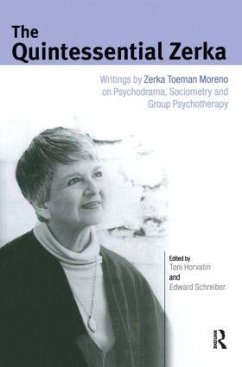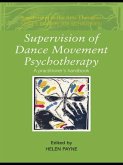Toni Horvatin / Edward Schreiber (eds.)Writings by Zerka Toeman Moreno on Psychodrama, Sociometry and Group Psychotherapy
The Quintessential Zerka
Writings by Zerka Toeman Moreno on Psychodrama, Sociometry and Group Psychotherapy
Herausgeber: Schreiber, Edward; Horvatin, Toni
Toni Horvatin / Edward Schreiber (eds.)Writings by Zerka Toeman Moreno on Psychodrama, Sociometry and Group Psychotherapy
The Quintessential Zerka
Writings by Zerka Toeman Moreno on Psychodrama, Sociometry and Group Psychotherapy
Herausgeber: Schreiber, Edward; Horvatin, Toni
- Gebundenes Buch
- Merkliste
- Auf die Merkliste
- Bewerten Bewerten
- Teilen
- Produkt teilen
- Produkterinnerung
- Produkterinnerung
The Quintessential Zerka documents the origins and development of the theory and practice of psychodrama, sociometry and group psychotherapy through the work and innovation of its co-creator, Zerka Toeman Moreno.
Andere Kunden interessierten sich auch für
![Performing Psychology Performing Psychology]() Performing Psychology178,99 €
Performing Psychology178,99 €![America Under the Influence America Under the Influence]() Chloë Rae EdmonsonAmerica Under the Influence180,99 €
Chloë Rae EdmonsonAmerica Under the Influence180,99 €![Supervision of Dance Movement Psychotherapy Supervision of Dance Movement Psychotherapy]() Helen Payne (ed.)Supervision of Dance Movement Psychotherapy155,99 €
Helen Payne (ed.)Supervision of Dance Movement Psychotherapy155,99 €![The Handbook of Music Therapy The Handbook of Music Therapy]() The Handbook of Music Therapy169,99 €
The Handbook of Music Therapy169,99 €![The Coach's Guide to Completing Creative Work The Coach's Guide to Completing Creative Work]() The Coach's Guide to Completing Creative Work168,99 €
The Coach's Guide to Completing Creative Work168,99 €![The Life and Legacy of Robert Ault, Art Therapy Pioneer The Life and Legacy of Robert Ault, Art Therapy Pioneer]() Libby SchmankeThe Life and Legacy of Robert Ault, Art Therapy Pioneer169,99 €
Libby SchmankeThe Life and Legacy of Robert Ault, Art Therapy Pioneer169,99 €![The Art of Grief The Art of Grief]() The Art of Grief170,99 €
The Art of Grief170,99 €-
-
-
The Quintessential Zerka documents the origins and development of the theory and practice of psychodrama, sociometry and group psychotherapy through the work and innovation of its co-creator, Zerka Toeman Moreno.
Hinweis: Dieser Artikel kann nur an eine deutsche Lieferadresse ausgeliefert werden.
Hinweis: Dieser Artikel kann nur an eine deutsche Lieferadresse ausgeliefert werden.
Produktdetails
- Produktdetails
- Verlag: Taylor & Francis
- Seitenzahl: 352
- Erscheinungstermin: 20. April 2006
- Englisch
- Abmessung: 234mm x 162mm x 31mm
- Gewicht: 649g
- ISBN-13: 9781583917282
- ISBN-10: 1583917284
- Artikelnr.: 22834274
- Herstellerkennzeichnung
- Libri GmbH
- Europaallee 1
- 36244 Bad Hersfeld
- gpsr@libri.de
- Verlag: Taylor & Francis
- Seitenzahl: 352
- Erscheinungstermin: 20. April 2006
- Englisch
- Abmessung: 234mm x 162mm x 31mm
- Gewicht: 649g
- ISBN-13: 9781583917282
- ISBN-10: 1583917284
- Artikelnr.: 22834274
- Herstellerkennzeichnung
- Libri GmbH
- Europaallee 1
- 36244 Bad Hersfeld
- gpsr@libri.de
Toni Horvatin is a social worker, counselor, and Playback Theatre practitioner in New York. Edward Schreiber is Director of the Moreno Institute East in Northampton, Massachusetts
Foreword. Introduction. Chapter One: Beginnings (1944-1948), "Role Analysis
and Audience Structure" Sociometry (1944). "A Sociodramatic Audience Test"
Sociometry (1945). "Psychodramatic Research of Pre-marital Couples"
Sociometry (1945). "Audience Reactions to Therapeutic Films" Sociometry
(1945). "Clinical Psychodrama: Auxiliary Ego, Double, and Mirror Technique"
Sociometry (1946). "Psychodrama, its Relation to Stage, Radio and Motion
Pictures" Sociatry (1947). "The 'Double Situation' in Psychodrama" Sociatry
(1948). Chapter Two: Early Pioneers (1949-1965), "History of the
Sociometric Movement in Headlines" Sociometry (1949). "Psychodrama in a
Well-baby Clinic" Group Psychotherapy (1951). "Psychodrama in the Crib"
Group Psychotherapy (1954). "Notes on Spontaneous Learning 'in situ' versus
Learning the Academic Way" Group Psychotherapy (1958). "The 'Reluctant
Therapist' and the 'Reluctant Audience' Technique in Psychodrama" Group
Psychotherapy (1958). "A Survey of Psychodramatic Techniques" Group
Psychotherapy (1959). "The Twenty-fifth Anniversary of the American Theatre
of Psychodrama" Group Psychotherapy (1962). "The Saga of Sociometry" Group
Psychotherapy (1965), "Psychodramatic Rules. Techniques and Adjunctive
Methods" Group Psychotherapy (1965). Chapter Three: Transitions
(1966-1974),."Evolution and Dynamics of the Group Psychotherapy Movement"
International Handbook of Group Psychotherapy (1966). "Sociogenesis of
Individuals and Groups" International Handbook of Group Psychotherapy
(1966). "The Seminal Mind of J. L. Moreno and His Influence Upon the
Present Generation" International Journal of Sociometry and Sociatry
(1967). "Psychodrama on Closed and Open Circuit Television" Group
Psychotherapy (1968). "Moreneans. The Heretics of Yesterday and the
Orthodoxy of Today" Group Psychotherapy (1969). "Practical Aspects of
Psychodrama" Group Psychotherapy (1969). "Beyond Aristotle, Breuer and
Freud: Moreno's Contribution to the Concept of Catharsis" Group
Psychotherapy and Psychodrama (1971). "Note on Psychodrama, Sociometry,
Individual Psychotherapy and the Quest for Unconditional Love," Group
Psychotherapy and Psychodrama (1972). "Psychodrama of Young Mothers" Group
Psychotherapy (1974). Chapter Four: On Her Own (1975-1998). "The
Significance of Doubling and Role Reversal for Cosmic Man" Group
Psychotherapy (1975). "The Function of the Auxiliary Ego in Psychodrama
with Special Reference to Psychotic Patients" Group Psychotherapy,
Psychodrama and Sociometry (1978). "The Eight Stages of Cosmic Beings in
Terms of Capacity and Need to Double and Role Reverse" Unpublished Paper
(1980). "Psychodrama" in Comprehensive Group Psychotherapy (Kaplan and
Sadock, (Eds.) (1983). "J. L. Moreno's Concept of Ethical Anger" Group
Psychotherapy, Psychodrama and Sociometry (1986). "Psychodrama, Role
Theory, and the Concept of the Social Atom" in The Evolution of
Psychotherapy, J. Zeig (Ed.) (1990). "Note on Some Forms of Resistance to
Psychodrama" Group Psychotherapy, Psychodrama and Sociometry (1991). "Time,
Space, Reality, and the Family: Psychodrama with a Blended (Reconstituted)
Family" in Psychodrama, Inspiration and Technique, Holmes and Karp, (Eds.)
(1991). "The Many Faces of Drama" Address to the National Association of
Drama Therapists, November 15, 1997. Chapter 5: The New Millenium and
Beyond (2000 - Present). "In the Spirit of Two Thousand" Plenary Address.
Annual Conference of the American Association of Group Psychotherapy and
Psychodrama. New York City, March 21, 2000. "The Function of 'Tele' in
Human Relations" in The Evolution of Psychotherapy: A Meeting of the Minds,
J. Zeig (Ed.). The Milton H. Erickson Foundation (2000). "Suicide
Prevention by the Use of Perceptual Sociometric Interventions" Unpublished
Paper (2004).
and Audience Structure" Sociometry (1944). "A Sociodramatic Audience Test"
Sociometry (1945). "Psychodramatic Research of Pre-marital Couples"
Sociometry (1945). "Audience Reactions to Therapeutic Films" Sociometry
(1945). "Clinical Psychodrama: Auxiliary Ego, Double, and Mirror Technique"
Sociometry (1946). "Psychodrama, its Relation to Stage, Radio and Motion
Pictures" Sociatry (1947). "The 'Double Situation' in Psychodrama" Sociatry
(1948). Chapter Two: Early Pioneers (1949-1965), "History of the
Sociometric Movement in Headlines" Sociometry (1949). "Psychodrama in a
Well-baby Clinic" Group Psychotherapy (1951). "Psychodrama in the Crib"
Group Psychotherapy (1954). "Notes on Spontaneous Learning 'in situ' versus
Learning the Academic Way" Group Psychotherapy (1958). "The 'Reluctant
Therapist' and the 'Reluctant Audience' Technique in Psychodrama" Group
Psychotherapy (1958). "A Survey of Psychodramatic Techniques" Group
Psychotherapy (1959). "The Twenty-fifth Anniversary of the American Theatre
of Psychodrama" Group Psychotherapy (1962). "The Saga of Sociometry" Group
Psychotherapy (1965), "Psychodramatic Rules. Techniques and Adjunctive
Methods" Group Psychotherapy (1965). Chapter Three: Transitions
(1966-1974),."Evolution and Dynamics of the Group Psychotherapy Movement"
International Handbook of Group Psychotherapy (1966). "Sociogenesis of
Individuals and Groups" International Handbook of Group Psychotherapy
(1966). "The Seminal Mind of J. L. Moreno and His Influence Upon the
Present Generation" International Journal of Sociometry and Sociatry
(1967). "Psychodrama on Closed and Open Circuit Television" Group
Psychotherapy (1968). "Moreneans. The Heretics of Yesterday and the
Orthodoxy of Today" Group Psychotherapy (1969). "Practical Aspects of
Psychodrama" Group Psychotherapy (1969). "Beyond Aristotle, Breuer and
Freud: Moreno's Contribution to the Concept of Catharsis" Group
Psychotherapy and Psychodrama (1971). "Note on Psychodrama, Sociometry,
Individual Psychotherapy and the Quest for Unconditional Love," Group
Psychotherapy and Psychodrama (1972). "Psychodrama of Young Mothers" Group
Psychotherapy (1974). Chapter Four: On Her Own (1975-1998). "The
Significance of Doubling and Role Reversal for Cosmic Man" Group
Psychotherapy (1975). "The Function of the Auxiliary Ego in Psychodrama
with Special Reference to Psychotic Patients" Group Psychotherapy,
Psychodrama and Sociometry (1978). "The Eight Stages of Cosmic Beings in
Terms of Capacity and Need to Double and Role Reverse" Unpublished Paper
(1980). "Psychodrama" in Comprehensive Group Psychotherapy (Kaplan and
Sadock, (Eds.) (1983). "J. L. Moreno's Concept of Ethical Anger" Group
Psychotherapy, Psychodrama and Sociometry (1986). "Psychodrama, Role
Theory, and the Concept of the Social Atom" in The Evolution of
Psychotherapy, J. Zeig (Ed.) (1990). "Note on Some Forms of Resistance to
Psychodrama" Group Psychotherapy, Psychodrama and Sociometry (1991). "Time,
Space, Reality, and the Family: Psychodrama with a Blended (Reconstituted)
Family" in Psychodrama, Inspiration and Technique, Holmes and Karp, (Eds.)
(1991). "The Many Faces of Drama" Address to the National Association of
Drama Therapists, November 15, 1997. Chapter 5: The New Millenium and
Beyond (2000 - Present). "In the Spirit of Two Thousand" Plenary Address.
Annual Conference of the American Association of Group Psychotherapy and
Psychodrama. New York City, March 21, 2000. "The Function of 'Tele' in
Human Relations" in The Evolution of Psychotherapy: A Meeting of the Minds,
J. Zeig (Ed.). The Milton H. Erickson Foundation (2000). "Suicide
Prevention by the Use of Perceptual Sociometric Interventions" Unpublished
Paper (2004).
Foreword. Introduction. Chapter One: Beginnings (1944-1948), "Role Analysis
and Audience Structure" Sociometry (1944). "A Sociodramatic Audience Test"
Sociometry (1945). "Psychodramatic Research of Pre-marital Couples"
Sociometry (1945). "Audience Reactions to Therapeutic Films" Sociometry
(1945). "Clinical Psychodrama: Auxiliary Ego, Double, and Mirror Technique"
Sociometry (1946). "Psychodrama, its Relation to Stage, Radio and Motion
Pictures" Sociatry (1947). "The 'Double Situation' in Psychodrama" Sociatry
(1948). Chapter Two: Early Pioneers (1949-1965), "History of the
Sociometric Movement in Headlines" Sociometry (1949). "Psychodrama in a
Well-baby Clinic" Group Psychotherapy (1951). "Psychodrama in the Crib"
Group Psychotherapy (1954). "Notes on Spontaneous Learning 'in situ' versus
Learning the Academic Way" Group Psychotherapy (1958). "The 'Reluctant
Therapist' and the 'Reluctant Audience' Technique in Psychodrama" Group
Psychotherapy (1958). "A Survey of Psychodramatic Techniques" Group
Psychotherapy (1959). "The Twenty-fifth Anniversary of the American Theatre
of Psychodrama" Group Psychotherapy (1962). "The Saga of Sociometry" Group
Psychotherapy (1965), "Psychodramatic Rules. Techniques and Adjunctive
Methods" Group Psychotherapy (1965). Chapter Three: Transitions
(1966-1974),."Evolution and Dynamics of the Group Psychotherapy Movement"
International Handbook of Group Psychotherapy (1966). "Sociogenesis of
Individuals and Groups" International Handbook of Group Psychotherapy
(1966). "The Seminal Mind of J. L. Moreno and His Influence Upon the
Present Generation" International Journal of Sociometry and Sociatry
(1967). "Psychodrama on Closed and Open Circuit Television" Group
Psychotherapy (1968). "Moreneans. The Heretics of Yesterday and the
Orthodoxy of Today" Group Psychotherapy (1969). "Practical Aspects of
Psychodrama" Group Psychotherapy (1969). "Beyond Aristotle, Breuer and
Freud: Moreno's Contribution to the Concept of Catharsis" Group
Psychotherapy and Psychodrama (1971). "Note on Psychodrama, Sociometry,
Individual Psychotherapy and the Quest for Unconditional Love," Group
Psychotherapy and Psychodrama (1972). "Psychodrama of Young Mothers" Group
Psychotherapy (1974). Chapter Four: On Her Own (1975-1998). "The
Significance of Doubling and Role Reversal for Cosmic Man" Group
Psychotherapy (1975). "The Function of the Auxiliary Ego in Psychodrama
with Special Reference to Psychotic Patients" Group Psychotherapy,
Psychodrama and Sociometry (1978). "The Eight Stages of Cosmic Beings in
Terms of Capacity and Need to Double and Role Reverse" Unpublished Paper
(1980). "Psychodrama" in Comprehensive Group Psychotherapy (Kaplan and
Sadock, (Eds.) (1983). "J. L. Moreno's Concept of Ethical Anger" Group
Psychotherapy, Psychodrama and Sociometry (1986). "Psychodrama, Role
Theory, and the Concept of the Social Atom" in The Evolution of
Psychotherapy, J. Zeig (Ed.) (1990). "Note on Some Forms of Resistance to
Psychodrama" Group Psychotherapy, Psychodrama and Sociometry (1991). "Time,
Space, Reality, and the Family: Psychodrama with a Blended (Reconstituted)
Family" in Psychodrama, Inspiration and Technique, Holmes and Karp, (Eds.)
(1991). "The Many Faces of Drama" Address to the National Association of
Drama Therapists, November 15, 1997. Chapter 5: The New Millenium and
Beyond (2000 - Present). "In the Spirit of Two Thousand" Plenary Address.
Annual Conference of the American Association of Group Psychotherapy and
Psychodrama. New York City, March 21, 2000. "The Function of 'Tele' in
Human Relations" in The Evolution of Psychotherapy: A Meeting of the Minds,
J. Zeig (Ed.). The Milton H. Erickson Foundation (2000). "Suicide
Prevention by the Use of Perceptual Sociometric Interventions" Unpublished
Paper (2004).
and Audience Structure" Sociometry (1944). "A Sociodramatic Audience Test"
Sociometry (1945). "Psychodramatic Research of Pre-marital Couples"
Sociometry (1945). "Audience Reactions to Therapeutic Films" Sociometry
(1945). "Clinical Psychodrama: Auxiliary Ego, Double, and Mirror Technique"
Sociometry (1946). "Psychodrama, its Relation to Stage, Radio and Motion
Pictures" Sociatry (1947). "The 'Double Situation' in Psychodrama" Sociatry
(1948). Chapter Two: Early Pioneers (1949-1965), "History of the
Sociometric Movement in Headlines" Sociometry (1949). "Psychodrama in a
Well-baby Clinic" Group Psychotherapy (1951). "Psychodrama in the Crib"
Group Psychotherapy (1954). "Notes on Spontaneous Learning 'in situ' versus
Learning the Academic Way" Group Psychotherapy (1958). "The 'Reluctant
Therapist' and the 'Reluctant Audience' Technique in Psychodrama" Group
Psychotherapy (1958). "A Survey of Psychodramatic Techniques" Group
Psychotherapy (1959). "The Twenty-fifth Anniversary of the American Theatre
of Psychodrama" Group Psychotherapy (1962). "The Saga of Sociometry" Group
Psychotherapy (1965), "Psychodramatic Rules. Techniques and Adjunctive
Methods" Group Psychotherapy (1965). Chapter Three: Transitions
(1966-1974),."Evolution and Dynamics of the Group Psychotherapy Movement"
International Handbook of Group Psychotherapy (1966). "Sociogenesis of
Individuals and Groups" International Handbook of Group Psychotherapy
(1966). "The Seminal Mind of J. L. Moreno and His Influence Upon the
Present Generation" International Journal of Sociometry and Sociatry
(1967). "Psychodrama on Closed and Open Circuit Television" Group
Psychotherapy (1968). "Moreneans. The Heretics of Yesterday and the
Orthodoxy of Today" Group Psychotherapy (1969). "Practical Aspects of
Psychodrama" Group Psychotherapy (1969). "Beyond Aristotle, Breuer and
Freud: Moreno's Contribution to the Concept of Catharsis" Group
Psychotherapy and Psychodrama (1971). "Note on Psychodrama, Sociometry,
Individual Psychotherapy and the Quest for Unconditional Love," Group
Psychotherapy and Psychodrama (1972). "Psychodrama of Young Mothers" Group
Psychotherapy (1974). Chapter Four: On Her Own (1975-1998). "The
Significance of Doubling and Role Reversal for Cosmic Man" Group
Psychotherapy (1975). "The Function of the Auxiliary Ego in Psychodrama
with Special Reference to Psychotic Patients" Group Psychotherapy,
Psychodrama and Sociometry (1978). "The Eight Stages of Cosmic Beings in
Terms of Capacity and Need to Double and Role Reverse" Unpublished Paper
(1980). "Psychodrama" in Comprehensive Group Psychotherapy (Kaplan and
Sadock, (Eds.) (1983). "J. L. Moreno's Concept of Ethical Anger" Group
Psychotherapy, Psychodrama and Sociometry (1986). "Psychodrama, Role
Theory, and the Concept of the Social Atom" in The Evolution of
Psychotherapy, J. Zeig (Ed.) (1990). "Note on Some Forms of Resistance to
Psychodrama" Group Psychotherapy, Psychodrama and Sociometry (1991). "Time,
Space, Reality, and the Family: Psychodrama with a Blended (Reconstituted)
Family" in Psychodrama, Inspiration and Technique, Holmes and Karp, (Eds.)
(1991). "The Many Faces of Drama" Address to the National Association of
Drama Therapists, November 15, 1997. Chapter 5: The New Millenium and
Beyond (2000 - Present). "In the Spirit of Two Thousand" Plenary Address.
Annual Conference of the American Association of Group Psychotherapy and
Psychodrama. New York City, March 21, 2000. "The Function of 'Tele' in
Human Relations" in The Evolution of Psychotherapy: A Meeting of the Minds,
J. Zeig (Ed.). The Milton H. Erickson Foundation (2000). "Suicide
Prevention by the Use of Perceptual Sociometric Interventions" Unpublished
Paper (2004).









